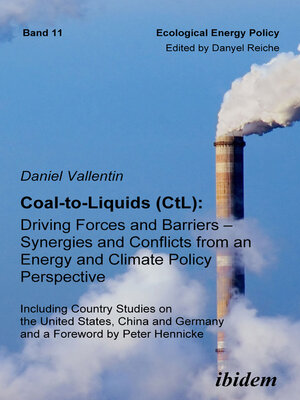Coal-to-Liquids (CtL)
ebook ∣ Driving Forces and Barriers – Synergies and Conflicts from an Energy and Climate Policy Perspective: Including Country Studies on the United States, China and Germany · Ecological Energy Policy (EEP)
By Daniel Vallentin

Sign up to save your library
With an OverDrive account, you can save your favorite libraries for at-a-glance information about availability. Find out more about OverDrive accounts.
Find this title in Libby, the library reading app by OverDrive.



Search for a digital library with this title
Title found at these libraries:
| Library Name | Distance |
|---|---|
| Loading... |
Several countries with large coal deposits but limited domestic oil reserves show high interest in coal-to-liquid (CtL) technologies, which could reduce crude oil imports by converting coal into liquid hydrocarbon fuels. After decades of successful large-scale operating experiences in South Africa, CtL activities in the United States, China and Germany have been fanned by the high oil price in the last years.
However, CtL indicates negative techno-economic and resource-related features, such as high capital costs, high greenhouse gas discharges and high water consumption. Therefore, the technology's diffusion strongly depends on a favourable framework of policies and strong technology advocates. Daniel Vallentin analyses interdependencies between technical and non-technical parameters affecting the diffusion of CtL technologies in the United States, China and Germany. Applying the inter-disciplinary technological system approach, he identifies factors which determine the market prospects of CtL in these countries, including costs, the geographic distribution of coal reserves, actor constellations and technology, energy and climate policies. At the end of his study, he derives general conclusions with regard to driving forces and barriers for CtL diffusion. As the investigated countries are major consumers of energy and belong to the world's largest emitters of greenhouse gases, their strategies in substituting crude oil based fuels are of utmost global relevance. Therefore, Vallentin's study is recommended to experts, planners, decision-makers, and politicians in the field of climate and resource protection.







